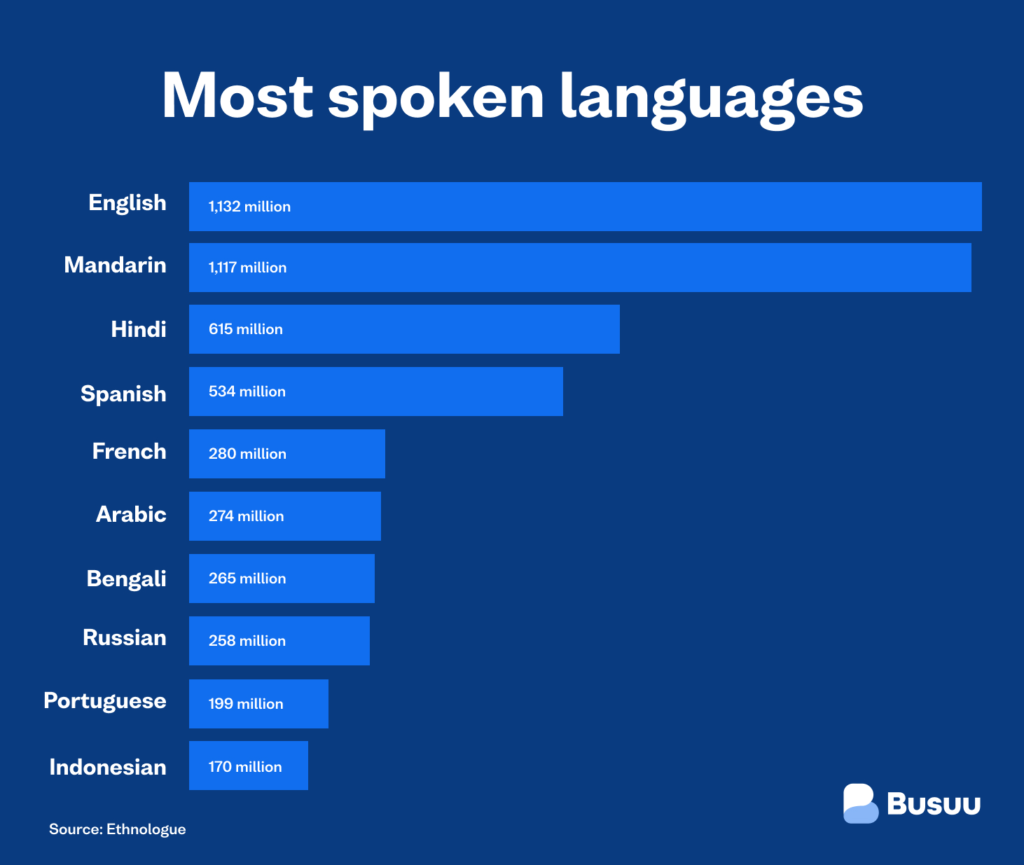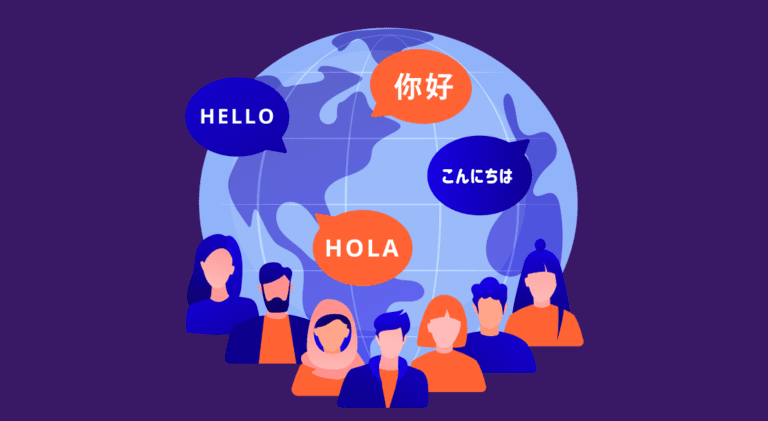Table of Contents
- Introduction
- Top 10 languages spoken in the world
- Key takeaways
- Conclusion
- FAQ
Languages are one of the most important elements of a culture. They are a means of communication and an expression of national identity. They give us a sense of belonging to a community and help us express our thoughts or feelings in the most effective way possible. However, all languages are not equal: some are spoken more widely than others.
Even though there are over 7,000 languages, only 23 represent more than half of the global total. It’s not just a statistic: it’s a crucial truth to consider when developing a growth strategy. Knowledge of various languages opens up new perspectives, whether for a job or personal reasons.
Top 10 Languages Spoken in the World
In this article, we will look at some of the commonly spoken languages in the world languages in the world and explain what makes them so popular.

1. English
First and foremost, English has to be one of the most commonly spoken languages in the world, with over 1132 Million people speaking it worldwide. Out of these 1132 Million people, 379 Million are native people, while 753 are non-native. The data is crazy and makes English among speakers the most popular of them all.
English is a universal language, and it is understood worldwide. Learning English is a must in today’s world of information technology and hi-tech communication.
If you are a native speaker of English and you want to travel, it will be simple for you to learn any other language. If you are not a native speaker of English, it might be easier for you to learn English than any other foreign language.
2. Mandarin
Another language that tops the list and is one of the most commonly spoken languages in the world is Mandarin, with over 1117 Million speakers comprising 918 Million native speakers and 199 Million non-native speakers.
It is necessary to remember that Mandarin is not a language but a family of dialects. The only factor that unites all the Chinese dialects under one name is that their speakers can understand each other. In reality, it is challenging to speak a single Chinese language.
Mandarin has more native speakers than any other language in the world, making it the most widely used language in everyday life. However, when counting native and non-native speakers, English takes the lead by a large margin.
3. Hindi
Third, the most widely spoken language in the world is Hindi. It has over 615 million people speaking across the globe. It comprises 341 million native speakers and the remaining 274 non-native speakers.
Hindi is the fourth most-spoken native language globally, after Mandarin, Spanish, and English. But it’s spoken by more people than any other language! Hindi is one of India’s 22 official languages, along with English. India is the world’s second-most populous country. Most people speak Hindi because of the diversity of languages that co-exist. There are mostly 1600 languages along with Hindi, thus communicating in common terms; Hindi is used extensively.
4. Spanish
The language has about 534 million speakers and is one of the most commonly spoken languages in the world globally. It comprises 460 million native speakers and 74 million non-native speakers.
Many people consider Spanish to be one of the most beautiful languages in the world. The truth is that it is a language that cultures from all over the world have enriched. No wonder it is praised as one of the most popular languages in the world.
In terms of native speakers, it is the world’s second most widely spoken language. It’s also the third most popular site on the web. It is one of the United Nation’s six official languages and is essential for international trade and tourism.
5. French
It has approximately 280 million speakers, with native being 77 million people and non-native being the other 203 million people making it one of the commonly spoken languages in the world.
The French language results from the historical expansion of the Kingdom of France. Over time, the French language has spread throughout Europe, Africa, Asia, and America. Today it is an official or administrative language in 29 countries on different continents with a total population of 220 million people, giving it an international status to be reckoned with.
6. Arabic
Arabic, too, features in the list of most commonly spoken languages in the world. The speaking population is 274 million, and it has native speakers of approximately 228 million, and the remaining non-native speakers are 29 million.
The major language of 26 countries is Arabic. It is a combination of dialects due to territorial dispersion. It is also Islam’s liturgical language. It is not just the language that preserves the Arab world’s vast cultural heritage, but it is also a crucial instrument for doing business in this region.
Arabic is a useful language for business people and individuals looking for work in firms with operations in Arab countries. Furthermore, many multinational organizations have made learning Arabic a priority due to recent political events.

7. Bengali
Bengali is also one of the commonly spoken languages in the world. 265 million people all over the world use Bengali as their language. And it has 228 million native speakers with 37 million non-native speakers.
Bangladesh’s official language is Bengali. Bengali is also spoken in portions of Burma and India. It might come as a shock to you that millions can speak a language of such a narrow place of people outside the country, but the population density of the location, however, explains the fact.
8. Russian
With 258 million speakers, Russia is also a widely spoken language in the world. It has 154 million native speakers and 104 million non-native speakers.
It is not much of a surprise to compare Russia’s geographical area with the people speaking Russian as their language. Both are surprisingly high, making Russian a widely spoken language in the world. It is the most spoken European language and is now spoken in late Soviet Union countries.
9. Portuguese
Portuguese also features in the list of most spoken languages globally. It has around 234 million speakers. Around 221 million are native speakers, while 13 million are non-native speakers.
Another language that grew in popularity throughout the European colonial period was Portuguese. It is now the official language of nine nations spread over Europe, North America, Africa, and Asia. Brazil is the largest proponent in terms of territory and number of speakers. In the Southern Hemisphere, it is also the most widely spoken language.
10. Indonesian
Last on the list of commonly spoken languages in the world is Indonesian. It has about 198 million speakers, with 43 million being native speakers and the other 155 million being non-native speakers.
Indonesia, the world’s fourth most populous country, speaks it as its official language. Remarkably, most of its speakers do not speak it as their first language. In a country with over 200 languages, it is thus a second language required for mutual understanding.

Key Takeaways
- Languages connect people.
- Languages depict different cultures worldwide and thus are extremely important to know.
- Languages are the doorway to new opportunities.
- But you need not know every language out there, but just learning these popular languages in the world will do the job for you.
- Ten most widely spoken languages in the world. 1. English 2. Mandarin 3. Hindi 4. Spanish 5. French 6. Arabic 7. Bengali 8. Russian 9. Portuguese 10. Indonesian
- Out of all of them, English is considered a universal language and is easier to learn. You can communicate in English anywhere around the globe because it is widely accepted, as said before.
Conclusion
We don’t know what language you speak, but we think you should learn to speak a few more.
Sure, there are many languages to choose from (the top ten most commonly spoken languages in the world are English, Mandarin Chinese, Hindi, Spanish, French, Arabic, Bengali, Russian, Portuguese, and Indonesian), but you have to start somewhere.
Languages are the glue that holds together societies and commerce on our planet. Learning new languages is an investment in yourself that will pay off in the future, both professionally and personally.
FAQs
Knowing other languages allows us to discover different cultures. When we speak another language, we open ourselves up to a whole new world of opportunities and experiences.
For example, people who can communicate in Spanish in Latin America and Chinese in China are more likely to progress in their professional careers than those who do not speak these languages.
Learning commonly spoken languages in the world has certain benefits.
– It is a cost-effective investment in yourself.
– Learning new languages can open up new perspectives on the world.
– Language learning can provide you with a competitive advantage in your career and open new job opportunities.
– Learning new languages is a great way to relax and socialize with other cultures.
– Learning languages can open the door to meeting new people, making friends, and traveling.
A3. With 1.5 billion speakers, English is the widely spoken language on the planet. As the world becomes more connected, English has become the primary language of global communication, particularly on the internet.
A4. To learn the widely spoken languages, you can quickly go to YouTube, see free tutorials, and then practice independently.
A5. Yes, it is totally fine if the one language you learn is English because it is widely spoken all across the planet and is easy to understand.
Latest Blogs
Explore how Google’s 2025 AI search updates triggered ranking chaos. Learn actionable strategies to adapt your SEO for AI Overviews, zero-click searches, and SERP volatility. Stay ahead now.
Learn how to rank on AI search engines like ChatGPT, Perplexity, and Gemini by optimizing your content for authority, structure, and relevance. Stay ahead in AI-driven search with this strategic guide.
Explore the best healthcare SEO services for your medical practice. Improve online visibility and effectively reach more patients in need of your services.
Get your hands on the latest news!
Similar Posts

Language
6 mins read
A Guide on How to Do Language Translation

Language
5 mins read
A Complete Guide to Advertisement Translation

Language
6 mins read